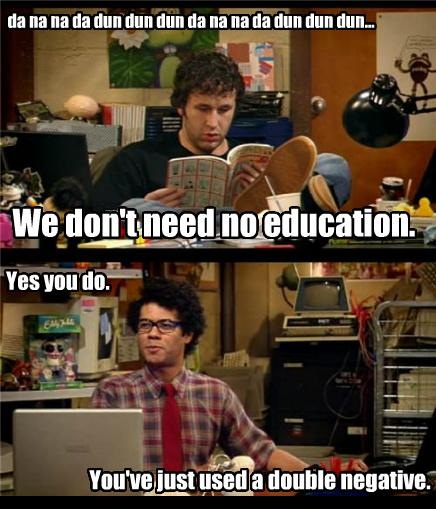Are We a Bunch of Dumb Asses?
In 2012, 28 million 15 year olds worldwide took the same test to assess their skills in maths, science and reading. The results of this test, known as PISA (Program for International Student Assessment), show that the UK failed to reach the top 20, ranking 26th in Maths, 23rd in Reading and 21st in Science. Oh very dear.
So who done good?
Shanghai, Singapore, Hong Kong and South Korea were the highest ranked, with Europe casually pussy footing behind. We haven’t done much worse than in the last assessment (although in Science we’ve been degraded from 16th to 21st) but the worrying thing is that we haven’t done much better either. With each country battling to become top of the world’s economy, where does the UK’s future stand when we are being enveloped by the progression of the others?

(Image via)
Who is to blame?
And here is where the arguments lie. Parents blame teachers, teachers blame the government, the government blames each other. People start to think of new ideas to aid our educationally deprived children: rise in teachers’ pay, smaller class sizes and so on and so on. But what is most evident to me, gathered from my recent experience of school, is that there is a sincere cultural issue here.
Perhaps it is better to ask not what Britain is doing wrong, but what the East Asian countries are doing “right”. Take South Korea, for example, somewhere in which, not so long ago, the majority of its citizens were illiterate and living in conditions we would’ve seen a few hundred years ago.
Not only do their students go to school for 8 hours (2 hours longer than our average), but their parents then fork out for tutors, or for their kids to attend second shift schools; this often takes them to around 9pm, when they are then expected to do their homework until the early hours of the morning. And this isn’t just when exams are coming up, this is every live long day. And the kids do it. They do it because they see education as the only ticket to a successful future.
So let’s work this out.
The exam question:
Liang Xiu and John are pupils.
If Liang Xiu spends 22 hours a day studying for the test and John spends 6 hours a day studying for the test, which pupil will score higher?
It’s a no brainer.
I recently started archiving my 14 years worth of diaries and became increasingly frustrated that I’d spent most of my adolescent years thinking about boys, boys and boys and not education, education, education.
Education was my future, but the future was a sea of uncertainty. Boys were the present, they were what I went to school for – so it seemed, anyway.
My school wasn’t filled with particularly driven pupils. Yes, there were the odd swats but it was full of a lot of kids who didn’t really understand the benefit of education.
“Why should I study French? Everyone speaks English…” was a popular one.
Or how about:
“What’s the point in studying history? It all happened in the past.”
And even I once said:
“I want to be an actress. I’m never going to use Pythagorus Theorem in my job. Why am I bothering?”
Forget PISA, it’s just statistics. Kids don’t have any drive to be educated and why would they?! At the moment, with the current rate of youth unemployment and with graduate employment at an all time low, there’s very little waiting for them at the end of the yellow brick road.
These kids are missing the point of education. Education isn’t just for a job, it’s for life.
Tags: Britain education PISA school
Categories: Mirror Mirror: Self Improvement Wise up!
2 Comments
My mom and I were just discussing this (she’s a retired teacher who still substitutes sometimes), since the US educational system didn’t score so well either. I definitely agree that it is partially a cultural issue. My high school had a boarding program with many South Korean students. Several mentioned that the difficulty of the educational system in their country was a major reason for them coming to the US. And while I respect that there is a high value placed on education in East Asian countries, I wonder if it’s obsessive? Student suicide rates are high in many of these countries, and I’m sure all that stress has other impacts on students too. I do think overall that the UK and US should adopt more of a focus on education though.